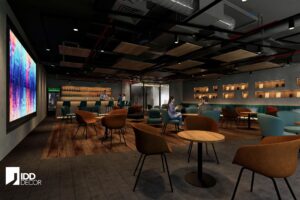
ESG stands for three core pillars:
Environmental
Social
Governance
It is not merely a set of technical indicators or performance metrics, but a comprehensive value system reflecting an organization’s responsibility, vision, and long-term strategic direction.
Within ESG, the “S” (Social) focuses on the relationship between businesses and people — including employees, communities, and all stakeholders.
For this reason, a full-service interior design and build firm plays a pivotal role in shaping workspaces that embody deep social consciousness.
ESG-compliant designs aim to build spaces accessible to everyone — including people with disabilities — while optimizing lighting, acoustics, and air quality.
According to MPL Interiors, “Inclusivity is an essential part of any ESG-ready office. Early planning and intentional design ensure equal opportunities and a comfortable environment for all, helping employees feel respected and connected to their workplace.”
Open-plan layouts, meeting rooms, breakout areas, pantries, and lounges are designed to encourage interdepartmental collaboration.
Amicus notes that “Designing offices that promote social interaction, teamwork, and personal development contributes to a positive corporate culture aligned with ESG objectives.” Such spaces enhance internal cohesion and inspire creativity.
Socially conscious interior design directly improves employee health and mental well-being. The World Green Building Council highlights that “Workspaces designed with attention to air quality, natural light, and ergonomic layouts help improve health, morale, and productivity.”
Incorporating greenery, quiet rooms, and relaxation areas — such as meditation spaces or silent rooms — helps reduce stress and improve overall quality of life and work.
A professional design firm listens carefully to a company’s internal culture to create environments that reflect its values and operational philosophy. Flexible spaces allow employees to feel at ease while balancing functionality and experience.
According to Zyeta on Medium, “Integrating social responsibility into office design fosters a positive work culture, increases employee loyalty, and strengthens organizational cohesion.”
Hybrid work models require offices that offer both quiet zones for focused work and open areas for dynamic teamwork. A full-service design and build approach helps companies adapt quickly to new work models without redesigning from scratch.
Below are three case studies from IDD Decor’s office design projects, demonstrating how the company implements the “Social” component of ESG in real environments:
 |
Publicis Groupe – Lounge AreaThe lounge area at Publicis Groupe Vietnam exemplifies the integration of the “S – Social” element in ESG-oriented interior design. The space features an open, friendly, and flexible layout with various seating clusters, encouraging employees to interact and connect beyond work hours. Warm tones, soft lighting, and tactile materials create a sense of comfort and relaxation, enhancing mental well-being and reducing stress. A modern bar counter combined with an artful lighting installation not only elevates aesthetics but also stimulates cross-department communication — promoting an open, human-centered corporate culture. This area is not merely a relaxation spot; it is a “connection hub” that nurtures pride, belonging, and community spirit — the very essence of the “S” in ESG. |
|
|
|
||
Publicis Groupe – Pantry AreaThe pantry space at Publicis Groupe Vietnam vividly reflects the Social factor in ESG. An open layout filled with natural light, rattan chairs, wooden tables, and soft, neutral tones fosters a welcoming and home-like atmosphere. Gentle lighting and nature-inspired wall art create a relaxing environment where employees can unwind after work.Beyond being a dining area, this pantry acts as a “social touchpoint” — encouraging casual conversations, interdepartmental connections, and cross-cultural understanding. Diverse seating arrangements — from individual tables to group benches — demonstrate inclusivity and adaptability, catering to varied employee needs. Such design nurtures mental well-being, reinforces corporate culture, and strengthens bonds across the organization — all in alignment with the “S” spirit of ESG. |

|
|
|
|
||

|
ECOBA Office – Open Discussion ZoneThe open discussion zone at ECOBA’s office is a model example of integrating the “S – Social” element in ESG-based workspace design. The circular layout surrounds a central green feature, symbolizing connection and equality in dialogue. Natural materials such as wood, plants, and sunlight create a calm, inviting atmosphere that supports mental wellness and creativity. This is more than a meeting area — it serves as a spiritual anchor for open exchanges, interdepartmental collaboration, and a corporate culture rooted in empathy and communication. The design embodies the core of the Social pillar in ESG: valuing people, nurturing communities, and building a holistic, inclusive, and human-centered work environment.
|
When an effective design firm transforms the Social pillar of ESG into physical spaces, businesses gain measurable advantages:
Higher productivity & lower turnover:
Employees working in socially conscious environments perform up to 38% better, while companies with strong internal culture experience only 13.9% turnover, compared to 48.4% in others (Source: Wikipedia – Social factor and employee engagement).
Improved work performance:
A supportive, wellness-focused environment enhances focus and reduces errors.
Stronger corporate culture:
Spaces that reflect company values and lifestyle naturally reinforce internal identity and brand alignment.
Greater talent attraction:
Millennials and Gen Z are particularly drawn to workplaces emphasizing social well-being — offering a clear recruitment advantage.
The Social (S) pillar in ESG is the heart of a sustainable workplace, where people are at the center. A full-service interior design and build firm plays a critical role in turning social commitments into real workplace experiences.
By designing inclusive environments that foster communication, support well-being, and reflect culture, they help businesses build organizations that are flexible, creative, and truly happy.
IDD Decor – Office Interior Design – Behind the Door Awaits the Journey to Success
Address: Doxaco Building, 307B Nguyễn Văn Trỗi, Tân Sơn Hòa Ward (formerly Ward 1, Tân Bình District), Ho Chi Minh City
Hotline: 0896 640 986
Website: idddecor.com
LinkedIn: IDD Decor Vietnam